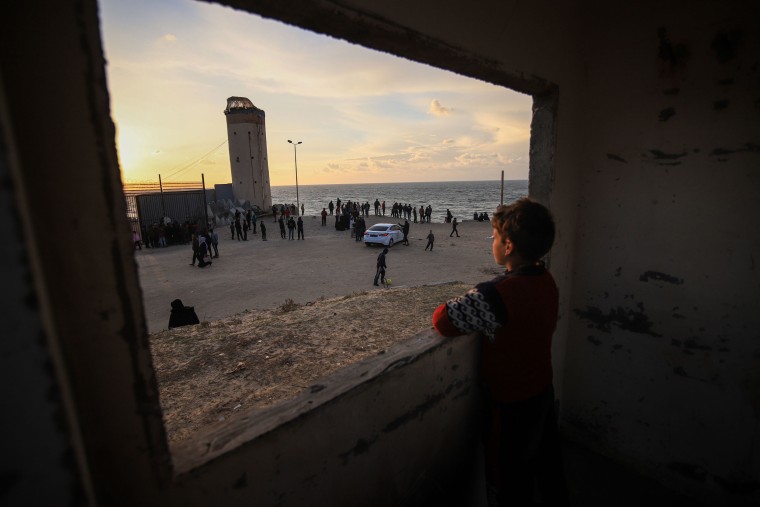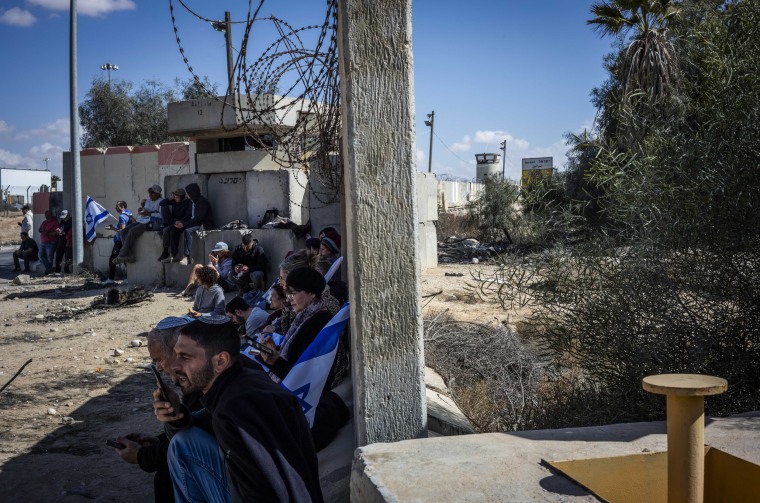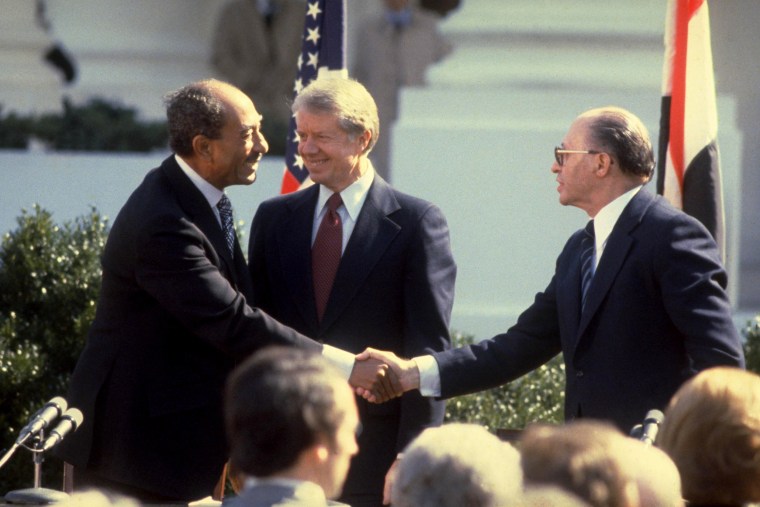As the Israeli military’s invasion of Rafah looms, Egypt, the Arab state next door, is building walls against refugees and threatens to pull out of a 45-year-old treaty that cemented Israel’s existence. In 1978, the deal brokered by President Jimmy Carter was a sign that the United States could bring warring parties together in a pragmatic peace. The treaty didn’t create a new friendship, but it was evidence the United States could help neighbors focus on economic development and diplomacy.
The treaty didn’t create a new friendship, but it was evidence the United States could help neighbors focus on economic development and diplomacy.
Now, as Israeli Prime Minister Benjamin Netanyahu’s military prepares its "powerful action in Rafah," a new generation of Egyptians and world leaders are wrestling with what it means to be allied with Israel and to rely on the United States. In threatening to pull out of the “Framework for Peace in the Middle East,” also called the Camp David Accords, Egyptian officials are doing what the Biden administration has so far been unwilling to do: exact a cost to Israel for ignoring the counsel of allies and continuing the war in Gaza. It is unlikely that Netanyahu will consider any consequences to be significant enough to stay his hand, but Egypt is taking a harder line than the United States, even when it has far more to risk in the chaos that's been unleashed by its neighbors Israel and Hamas.

Egypt is not only willing to say that Israel’s actions to send refugees into Sinai violate the demilitarized zone agreement between the two countries, but Egypt's officials are also saying in effect that their own $1 billion military trade with the United States is no longer worth the cost of the burden of supporting Israeli and U.S. policies. Despite being where the Arab League was founded, Egypt’s embrace of the Camp David Accords — and its acceptance of Israel — saw it temporarily kicked out of the group. Decades later, Egypt is telling the world that, at this moment, the greater risk is aligning with U.S.'s interests in the Middle East.
The Camp David Accords between Israel and Egypt were the first domino in a series of deals brokered by the United States in which Arab states recognized Israel’s right to exist and established regular contact. Deals with Bahrain, Jordan, Morocco, Sudan and the United Arab Emirates followed over the years, along with recent anticipation that Saudi Arabia would soon make its own peace with Israel’s existence.
Egypt is telling the world that in this moment, the greater risk is aligning with U.S. interests in the Middle East.
In 2018, when Egypt signed a $15 billion deal for gas exports from Israel, the agreement led to the creation of the Eastern Mediterranean Gas Forum in Cairo along with other countries in the region. Meanwhile, Egypt’s security cooperation in the Sinai allowed Israel to feel a measure of peace on its southern border. These diplomatic, economic and security cooperation ties were seen as beneficial to all countries involved, including the United States.
Last month, after the International Court of Justice called on Israel to take measures to prevent acts of genocide and allow more aid into Gaza, and said it would punish anyone who incites genocidal acts, Netanyahu and other right-wing politicians insisted they will “decide and act according to what is required for our security.” This week, the prime ministers of Australia, Canada and New Zealand issued a joint statement expressing their "grave concern" that what Israel would do in Rafah would be "catastrophic." Also this week, French President Emmanuel Macron described what Israel is doing in Gaza as "intolerable" and said the country's actions there "must cease." Netanyahu, though, said Israel will “fight until complete victory and this includes a powerful action in Rafah.”
Weeks earlier, in their pursuit of Hamas militants in the north of Gaza, the Israeli military promised that Palestinians could find safety and refuge in the south. Now poised to invade this last section of the enclave, the Israeli military has not provided the credible plan to evacuate civilians as requested by the Biden administration, and Netanyahu has rejected any two-state solution discussion, leaving Palestinians with nowhere to go once the assault begins. A civilian bloodbath is expected.

For weeks, as the war in Gaza unfolded, Egyptian officials have continually rejected the expectation they will take in refugees, citing their own inability to handle the influx of more than 1 million people and their unwillingness to be a party to Netanyahu’s effort to displace the people who might form a Palestinian state. Egypt’s diplomats have pressed for alternate solutions and pressed for Israel’s allies to use their leverage and influence to stop the war. Each day the war continues, Arab leaders are warning the Biden administration that the United States is not only losing credibility, but will soon lose its welcome mat in the region.
Egypt is now scrambling to secure its border with Gaza and Israel. It’s building an 8-square-mile enclosure and clearing land for what could be an influx of nearly 1.2 million Palestinians fleeing for safety. Despite reports that say the construction is meant to corral displaced Palestinians, the governor of Egypt’s North Sinai region denied Friday that that is the purpose of the enclosure.
Rather than wait for the United States or others to step in, Egyptian officials are not simply threatening, but actively preparing to pull out of a historic peace agreement that was once the hallmark of the U.S.’s ability to bring about peace and economic security.
Pulling out of the treaty would signal that Egypt now considers itself on its own. If that happens, the dominoes will fall the other way as other Arab states have their own reckoning, not only with Israel, but with a United States they now see as incapable of any real influence.
